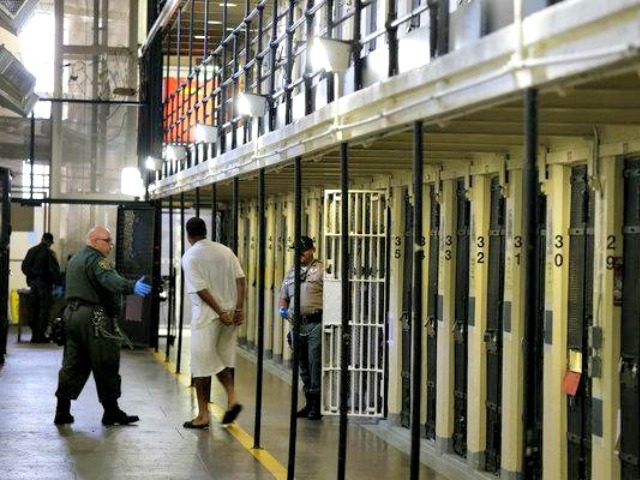A Republican U.S. Senate document circulating among GOP offices opposed to the so-called FIRST STEP Act, a criminal justice reform bill making its way through Capitol Hill, lists 20 violent crimes that would be eligible for early release under the legislation.
It remains to be seen if these matters will be addressed in the final version of the legislation, which is still in flux, but this circulating GOP Senate document illustrates just how divisive this particular legislative push is proving to be inside the GOP at a critical time for the party.
The staff-level letter, which lists the crimes that include drug trafficking, assaulting law enforcement, and making death threats against U.S. lawmakers, begins by addressing where this information came from.
A GOP Senate staffer wrote to colleagues in the letter obtained by Breitbart News exclusively:
I wanted to share some additional information about the FIRST STEP Act that may be of interest to your office. As the Department of Justice has confirmed, the bill creates a new time credit system that allows inmates to earn early release worth up to one-third of their sentence. Some offenders are ineligible to receive these early release time credits because the offense is listed on an ‘exclusion list’. But here is a partial list of crimes that an offender can commit and still be eligible for significant early release, according to Department of Justice Attorneys.
From there, the letter goes on to list the 20 violent crimes that would be eligible for early release under the bill:
- Trafficking cocaine or methamphetamines, even if convicted as a kingpin (18 U.S.C § 841(b)
- Strangling a spouse or an intimate partner (18 U.S.C. §113(a)(8)
- Trafficking fentanyl, except in rare cases (18 U.S.C. § 841(b))
- Providing or possessing contraband, including firearms, in prison (18 U.S.C. § 1791)
- Felonies committed while in a criminal street gang (18 U.S.C. § 521)
- Escape of prisoners (18 U.S.C. § 751)
- Rioting in a correctional facility (18 U.S.C. § 1792)
- Importing aliens for prostitution (18 U.S.C. § 1328)
- Assault with intent to commit rape or sexual abuse (18 U.S.C. § 3559(c)(2)(F))
- Threatening to murder a congressman, senator, or government official (18 U.S.C. § 115(a)(1)
- Drug-related robberies involving assault with a dangerous weapon (18 U.S.C. § 2118(c)(1)
- Violent carjacking resulting in serious bodily injury (18 U.S.C. § 2119(2))
- Stealing immigration documents for the purpose of keeping an immigrant in slavery (18 U.S.C. § 1592)
- Attempt or conspiracy to engage in human smuggling (18 U.S.C. § 1592)
- Failing to register as a sex offender (18 U.S.C. § 2250)
- Arson (18 U.S.C. § 81)
- Blackmail (18 U.S.C. § 873)
- Domestic assault by an habitual offender (18 U.S.C. § 117)
- Hate crimes (18 U.S.C. § 249)
- Assaulting a law enforcement officer with a deadly weapon (18 U.S.C. § 111(b))
At that point, the GOP senate document lists a series of questions for proponents of the bill:
- Would you consider these low-level or non-violent crimes?
- How can we trust the BOP to correctly categorize who is high vs. low risk?
- If the reasons these are not on the list is because they are obscure crimes, why is drug trafficking – the single most common offense – missing?
- Why are obscure violations of the Atomic Energy Code on the exclusion list but not these crimes?
- If you added provisions to the bill that Senator Booker and Democrats wanted, why won’t you add more violent crimes to the ‘exclusion from early release’ list that Republicans want?
- Why have an exclusion list in the first place if these crimes are missing from it?
- Can you promise that no offender who commits these crimes will ever be released early?
- How many offenders are in prison for each of these crimes and how many will be eligible to be released into my home state?
The fight over this bill is rankling some latent divisions between Republicans, pitting some from the more libertarian wing of the party against others from the more law-and-order wing. Complicating matters is that the White House has endorsed the bill, but it remains to be seen how serious this push for an overhaul of criminal justice guidelines truly is for now. It’s no secret, for instance, that Sen. Tom Cotton (R-AR)–a staunch ally of President Donald Trump’s in the U.S. Senate–is ardently opposed to the legislation, and has worked publicly against it, even getting into Twitter spats with proponents like Sen. Mike Lee (R-UT).
If this push is serious, it also remains to be seen when exactly this matter would be accomplished. With just a few weeks left in the lame duck session of Congress at the end of this year, and looming farm bill and spending bill battles–two significant must-pass legislative behemoths–the calendar has slim to no room for ambitious reform projects of lawmakers. A hobbled GOP, which strengthened its U.S. Senate majority but lost its House majority in the November midterm elections, may aim to work with Democrats next year on such a project–but other big picture bipartisan fights like infrastructure or paid family leave may take precedence over this one because of how divisive it is inside the president’s party.

COMMENTS
Please let us know if you're having issues with commenting.